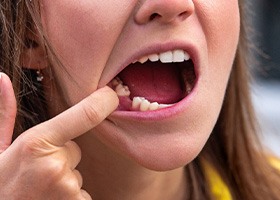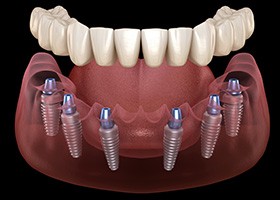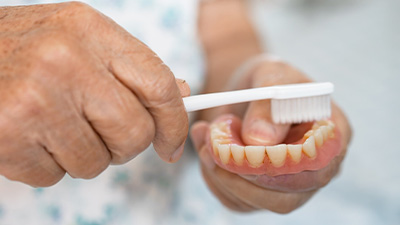Dentures – Irving, TX
Superior Quality for Full Smiles
 If you have lost all of your natural teeth, whether from periodontal disease, tooth decay, injury, or for any other reason, our dentures in Irving can help. They replace the missing teeth to help you regain your smile, which is a big benefit for your appearance as well as your health. Without support from the denture, facial muscles sag, making a person look older. Most importantly, a properly fitting denture helps you eat and speak – the things that people often take for granted until they have lost their teeth.
If you have lost all of your natural teeth, whether from periodontal disease, tooth decay, injury, or for any other reason, our dentures in Irving can help. They replace the missing teeth to help you regain your smile, which is a big benefit for your appearance as well as your health. Without support from the denture, facial muscles sag, making a person look older. Most importantly, a properly fitting denture helps you eat and speak – the things that people often take for granted until they have lost their teeth.
Why Choose 21st Century Dental of Irving for Dentures?
- Comprehensive Tooth Replacement
- Highly Modern Prosthetics for Superior Fit & Function
- Dental Implant Options Available
Who is a Good Candidate for Dentures?

Our dentists would recommend a denture to any patient who has lost some or all of their teeth. They offer an effective and affordable way to replace several teeth at one time, and they are ideally suited for patients with consecutive missing teeth. While dentures are normally associated with the senior population, they can be designed to suit patients of any age.
Effects of Missing Teeth

Tooth loss can have a major effect on your well-being. According to the American Academy of Periodontology, there are a multitude of negative consequences of missing teeth. They include facial sagging, difficulty speaking, challenges while eating, and low self-esteem. When you replace your missing teeth with dentures, you can improve all of these areas and your quality of life.
What Qualifies You for Dentures?

Dentures are ideal for those who are missing multiple teeth. Depending on the number of teeth that you are missing and where they are located in the mouth, we can put together a custom treatment plan to meet your needs. The main qualification that you need to meet is being in good oral health. This means that if you have any dental issues, like tooth decay or gum disease, they need to be eliminated ahead of time. After your existing teeth and gums are healthy, we can move forward with the rest of the process.
Alternative Tooth-Replacement Options

If dentures don’t seem like the best option for you, there are various other solutions available that may be a better fit. Here are some of the ones that we offer:
- Dental Bridge: A dental bridge works by “bridging” the gap in your smile with a replacement tooth. The replacement tooth is a called a “pontic,” and it is supported by two dental crowns that are placed on the adjacent teeth.
- Dental Implants: A dental implant is a titanium, screw-like post that is surgically insured into the jawbone to support a replacement tooth. This means that you must have a strong enough jawbone to support healthy implants. Dental implants have a higher upfront cost, but they are made to last for many decades.
Types of Dentures

A denture is a set of prosthetic teeth attached to a plastic base that is designed to look like your gums. A full denture replaces an entire row, while a partial fills the gaps left by several missing teeth when some healthy teeth still remain. Dentures can be held in place using suction, metal brackets, or with the help of a denture adhesive. By practicing proper care and maintenance, you can expect a traditional denture to last for five to seven years before they need replacement or relining. A denture that is retained by dental implants, however, can be expected to stick around several times longer.
Partial Dentures

If you still have some healthy natural teeth remaining, your dentist may recommend a partial denture. You have multiple options depending on the number of teeth missing and where they are located in the jaw.
A fixed partial denture in Las Colinas is permanently attached in your mouth, either connected to the surrounding natural teeth or with dental implants. It cannot be removed except by your dentist.
The other option is a removable partial denture, which you can take out for thorough cleaning and to give your mouth a break at night while you sleep.
Full Dentures

A conventional full denture is made and placed in the patient's mouth after the remaining teeth are removed and the gums have healed, which may take several months. An immediate denture is inserted as soon as the remaining teeth are removed. We will take measurements and make models of the patient's jaws during a preliminary visit. With immediate dentures, the denture wearer does not have to be without teeth during the healing period.
Implant Dentures

Dental implants are prosthetic tooth roots made of titanium, a material that bonds directly with your bone tissue. After a period of four to six months, the dental implants are as sturdy as any other bone in your body. Dentures affixed to dental implants provide unsurpassed stability, allowing you to eat, speak, and smile with full confidence.
You won’t need an individual dental implant for each missing tooth. Instead, your dentist can retain a full or partial denture on a small number of strategically placed dental implants. The All-on-4 dental implant method allows for a full denture in Irving to be supported using as few as four implant posts – and this method can be completed in just 24 hours. All-on-4 also eliminates the need for preliminary bone graft procedures that may be necessary for conventional dental implants.
How Dentures are Made

You’ll rely on your dentures for a variety of everyday activities, such as chewing your food and speaking. As such, they need to be made with your unique mouth in mind, and the materials used to create them must be very carefully chosen. Are you interested in learning more about how your new prosthesis will be made? Below is a closer look at the different steps of the process as well as the materials involved.
What are Dentures Made Of?

Dentures typically have artificial teeth made out of resin or porcelain. These materials are notable for how closely they match the appearance of natural tooth enamel. That being said, porcelain is the more popular choice, due in part to its high durability.
As for the base of the dentures (the part that supports the artificial teeth), there are many different materials that can potentially be used, but acrylic is most often chosen thanks to its ability to blend in with the natural gum tissue. It’s also relatively easy to adjust and repair if necessary. A partial denture can have an acrylic base but will also have clasps made out of metal.
The Denture Creation Process

At the start of the process, our team will take impressions of your gums before creating a model of your mouth. We might also measure your jaw. Then the model will be sent to a trusted dental laboratory.
Using the provided model as a reference, the technicians at the lab will make a replica of your gums out of wax. Then artificial teeth will be inserted into the wax; this is done with the help of a device known as an articulator. The resulting wax dentures will be sent to our office.
At this point, we’ll need you to come in so that we can confirm that the dentures fit as they should. Once we’ve made sure that everything looks okay, we’ll return the wax dentures to the lab so that the final stages of the process can begin.
The wax dentures will be placed in a flask. After plaster has been added (which helps ensure that the dentures keep their shape), the flask will be immersed in hot water. Once the wax has melted away, the acrylic that will serve as the base of the new dentures will be injected into the flask.
After the plaster has been removed, the dentures will be trimmed to get rid of any unneeded acrylic. Then the prosthesis will be carefully polished before it is sent to our office one last time. At this point, we’ll be able to schedule your final fitting appointment so that you can receive your beautiful replacement teeth.
Adjusting to Your New Dentures

You might have trouble eating and speaking with new dentures at first, and there may be a little bit of soreness. That being said, as long as you keep wearing your dentures, your mouth will eventually adjust to them. After a while, your prosthesis will start to feel similar to your natural teeth. If you want to speed up the adjustment process, try eating only soft foods and performing exercises for your facial muscles.
Benefits of Dentures

A patient’s quality of life instantly improves when they receive a customized denture. Not only are they able to smile with confidence again, but the support provided to the lips and facial muscles by the prosthetic also gives them a fuller, more youthful appearance. But these are not the only benefits of dentures in Irving. Take a look at the list of additional advantages you can expect when enjoying your new smile.
Psychological Benefits

A healthier, complete smile does more than allow patients to eat a wider array of foods. It also presents a fuller, more vibrant appearance. As a result, this tends to have a positive impact on one’s mental and emotional well-being. Being able to see a complete set of teeth after living with tooth loss for any length of time will immediately boost confidence and create a greater sense of peace knowing that speaking to others, smiling for the camera, and eating without embarrassment are now possible.
Clear Enunciation

A fully customized denture enables a person to speak clearly and not have to worry about stumbling over certain syllables. Initially, it may prove a bit difficult during the adjustment phase to say certain words or phrases; however, over time, this improves and encourages the patient to be more social and outgoing, which can be tremendously beneficial for mental health.
Improves Nutrition

Eating is also much easier with a full set of teeth, allowing a patient to enjoy a wide spectrum of foods, including nutritious ones that promote overall health, such as cooked meats and fibrous vegetables. Also, the denture will more evenly distribute a patient’s bite, which will take pressure off of the remaining teeth and gums, leading to more daily comfort.
Preserves Oral Health

With full or partial dentures, individuals can expect to enjoy better oral health because of the desire to take better care of one’s smile. With partial dentures, the person does not have to worry about natural, healthy teeth shifting out of alignment. This is because the denture helps to keep the remaining teeth in place. As a result, they need not worry about decay becoming an issue because of crowded teeth.
Expands Opportunity

No matter a person’s age, the chance to achieve better opportunities is now possible thanks to customized dentures. Whether in the workforce or looking to meet someone special, having a full set of teeth is likely to be the first thing people notice. When equipped with a beautiful smile, it tends to have a more positive effect, which can lead to greater job opportunities or landing a second date.
Understanding the Cost of Dentures

Perhaps you’re worried about the cost of dentures. Fair enough – a procedure won’t work, after all, if it “breaks the bank.” Still, the reality is that the prosthetics’ price varies by patient. As such, you’ll need to consult our dentists for an exact treatment estimate. Doing so, furthermore, helps you learn the factors behind a denture’s cost and your payment options. If you’d like to learn more, just keep reading or contact our office for details!
Factors That Affect the Cost of Dentures

At the consultation, our team will confirm whether you qualify for dentures. That means they’ll also assess the factors affecting a potential treatment’s price. Usually, these boil down to just three things:
- Need for Prep Work – If you need dental work before getting dentures, you’ll spend more than you would otherwise. Having a tooth pulled, for example, will add to your overall expense.
- Denture Base Material – In truth, the acrylic in a denture’s base can come in different kinds. Depending on which is used, treatment can cost more or less.
- Quality of Replacement Teeth – Denture teeth are made of acrylic or porcelain. Whereas the former is cheaper but wears quickly, the latter costs more but is longer-lasting.
Remember: Don’t just opt for the cheapest possible dentures. These kinds rely on subpar acrylic for their bases and teeth. To ensure your new teeth work well with your mouth, then, prioritize quality in your selection.
Are Implant Dentures More Expensive?

Indeed, implant dentures are more expensive than traditional ones. Keep in mind, however, that the higher price is justified. These restorations have unique benefits compared to others.
In contrast to regular models, implant dentures rely on dental implants. They’re thus highly stable and permanent, to the point that they don’t slip or fall. Plus, since implants fuse with your jaw, these dentures both look and act like natural teeth.
Implant dentures are also a money-saving investment. Given proper care, you see, the implants they connect with can last 15-30 years. You’d thus be able to avoid frequent repair and replacement visits, which can get pricey over time.
Does Dental Insurance Cover Dentures?

As it happens, dental insurance usually does cover dentures. Most plans view the prosthetics as a major procedure, meaning they’ll match 50% of the treatment’s cost.
Exceptions, however, can and do exist. There are some policies that limit coverage of dentures. So, make sure to confirm your insurance benefits beforehand. Our office can even assist you with that process.
Other Options for Making Dentures Affordable

Even if you lack dental insurance, there’s no need to fret; there are other ways to make denture treatment affordable. Quite a few practices, in fact, provide patients with unique payment options.
Take our own 21st Century Dental of Irving, for instance. Our office offers flexible financing through CareCredit. With their help, you can pay for our dentures with monthly, low-interest installments. You’d then be able to cover costs gradually instead of all at once.
If you’d like to get more financial facts on dentures, book a visit to our office. We’d be happy to give you new teeth that are also budget-friendly!
Dentures Aftercare

These prosthetic teeth attached to a gum base cannot become decayed or infected; however, if you want your restorations to last as long as possible, you must maintain them every day. Regardless of whether they are removable or fixed, daily care is necessary to avoid infection or other complications.
Removable Dentures
If you have the ability to take your dentures out, taking care of them requires a little more effort. You’ll need to do the following to keep them in good working condition.
Remove After Eating
Following meals or any eating, you’ll need a few minutes to take out your dentures to make sure you have no bits of food stuck between them and your gums. Not only can debris make your dentures uncomfortable, but it can also turn into bacteria-filled plaque that can lead to a gum infection or cavity (if you have remaining teeth). Clearing out any bits of food after eating will help you stay comfortable and reduce your odds of serious issues.
Clean Your Restoration
Although your dentures will not develop cavities, you must keep them clean because plaque buildup can irritate and infect gum tissue. As a result, you need to clean them every day. You may use denture cleanser tablets at night, but at minimum, you should gently brush your dentures with a soft toothbrush after meals.
Keep Your Dentures Safe
When they are not in your mouth, make sure you know exactly where your dentures are and make sure they are out of harm’s way. You don’t want to risk accidentally losing or breaking them. When you handle your dentures at the sink, we recommend having a towel underneath to prevent damage, just in case you drop them.
Remove Dentures When You Sleep
Did you know that your mouth produces much less saliva during sleep? As a result, your denture could dry out, and bacteria can spread rapidly. That’s why you need to place your dentures in a container of water or denture cleanser at night. This will keep them moisturized and prevent oral infection and irritation.
Notice Changes
When you wear the same dentures every day, it can be difficult to notice tiny changes over time. However, your jawbone will gradually change, affecting the fit of your denture. Consequently, improper fit can weaken your bite or allow the dentures to slip out of position while you talk or eat. Pay attention to how your dentures feel, and if they don’t quite fit right, let us know at your regular checkup appointment. We can make adjustments or replace them, so your smile stays strong and confident.
All-on-4 Dentures
If your prosthetic teeth are fixed to dental implants, the only daily maintenance you must perform is brushing and flossing—just like real teeth. Healthy choices in your diet, such as limiting your sugar and drinking plenty of water, can also extend the lifespan of your implant dentures. You’ll still need to come to us for regular checkups as well to make sure your All-on-4 dentures continue to be in good condition.
Denture FAQs
When Will I Need to Replace My Dentures?
The simple fact is that dentures in Las Colinas are not designed to last forever. Like real teeth, they’re subject to the wear and tear of daily biting and chewing. Also, they might not fit properly anymore once your jaw changes shape due to bone loss. Because of these factors, you can usually expect to get new dentures every 5 to 8 years or so. Of course, this is only necessary once we reach the point where the dentures can no longer reasonably be altered to fit your smile. That said, ill-fitting or damaged dentures can lead to a lot of discomfort and inconvenience, so it’s important to have them replaced when you need to.
How Often Do I Need to Visit the Dentist with Dentures?
Some patients think they’re done with dental appointments after they’ve lost all of their natural teeth. However, your dentures will still need to be examined periodically so that we can ensure that they’re in good shape and haven’t been excessively damaged in any way. We also need to check your gums, cheeks, and oral cavity for signs of irritation or infection, and most importantly, do an oral cancer screening. Ultimately, you should still be visiting us for regular checkups and cleanings at least once a year – in other words, almost but not as often as you would for your natural teeth.
Can I Sleep Wearing My Dentures?
Unless your dentures are permanently fixed to implants, it’s not a good idea to leave them in your mouth overnight. Your gums and jawbone will need time to recover from the strain of supporting the dentures all day. Furthermore, keeping your dentures in your mouth for a full 24 hours without ever taking them out to clean them is generally a bad idea. Before you go to bed, we recommend that you soak your dentures in a special solution in order to keep them moist until you’re ready to put them in the next day. The exception would relate to your breathing. If you snore, there is a chance you will snore more if you take them out during sleep. Do your own assessment, and if this is the case, be sure to take them out for a few hours in the evening before retiring with the dentures in place. And, if you do snore, you need to see our sleep experts.
When Do Dentures Need to Be Relined?
Changes and shifts in your jaw line or resorption of the bone will naturally occur once all of your teeth have been lost. Because of this, dentures that were once a perfect fit may no longer feel right in your mouth; they may even start to move around and cause painful sores. Eventually, they could start slipping or even fall out of your mouth altogether at inopportune moments. If you have reason to think the fit of your dentures has changed, get in touch with us immediately. We might also find signs that an adjustment is necessary during your regular checkups.
